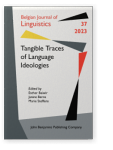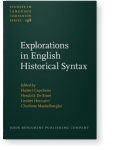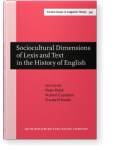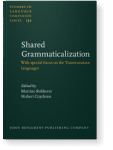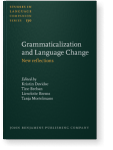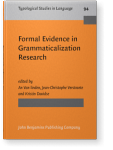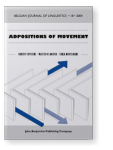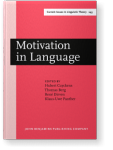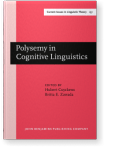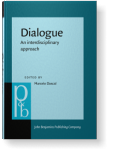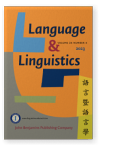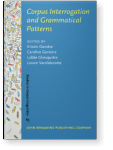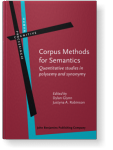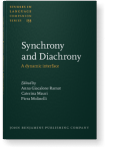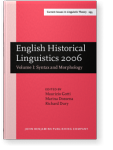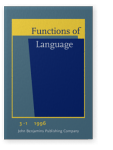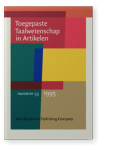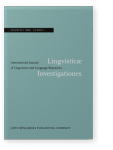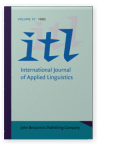Hubert Cuyckens
List of John Benjamins publications for which Hubert Cuyckens plays a role.
Yearbook
Explorations in English Historical Syntax
Edited by Hubert Cuyckens, Hendrik De Smet, Liesbet Heyvaert and Charlotte Maekelberghe
[Studies in Language Companion Series, 198] 2018. viii, 312 pp.
Subjects English linguistics | Germanic linguistics | Historical linguistics | Syntax
Sociocultural Dimensions of Lexis and Text in the History of English
Edited by Peter Petré, Hubert Cuyckens and Frauke D'hoedt
[Current Issues in Linguistic Theory, 343] 2018. viii, 258 pp.
Subjects English linguistics | Germanic linguistics | Historical linguistics
Shared Grammaticalization: With special focus on the Transeurasian languages
Edited by Martine Robbeets and Hubert Cuyckens
[Studies in Language Companion Series, 132] 2013. xv, 360 pp.
Subjects Historical linguistics | Theoretical linguistics
Grammaticalization and Language Change: New reflections
Edited by Kristin Davidse, Tine Breban, Lieselotte Brems and Tanja Mortelmans
[Studies in Language Companion Series, 130] 2012. viii, 342 pp.
Subjects Functional linguistics | Historical linguistics | Theoretical linguistics
Formal Evidence in Grammaticalization Research
Edited by An Van linden, Jean-Christophe Verstraete and Kristin Davidse
[Typological Studies in Language, 94] 2010. viii, 344 pp.
Subjects Historical linguistics | Syntax | Theoretical linguistics
Adpositions of Movement
Edited by Hubert Cuyckens, Walter De Mulder and Tanja Mortelmans
[Belgian Journal of Linguistics, 18] 2004. viii, 323 pp.
Subjects Theoretical linguistics
Motivation in Language: Studies in honor of Günter Radden
Edited by Hubert Cuyckens, Thomas Berg, René Dirven † and Klaus-Uwe Panther
[Current Issues in Linguistic Theory, 243] 2003. xxvi, 403 pp.
Subjects Cognition and language | Cognitive linguistics
Polysemy in Cognitive Linguistics: Selected papers from the International Cognitive Linguistics Conference, Amsterdam, 1997
Edited by Hubert Cuyckens and Britta E. Zawada
[Current Issues in Linguistic Theory, 177] 2001. xxvii, 296 pp.
Subjects Cognition and language | Semantics
Dialogue: An interdisciplinary approach
Edited by Marcelo Dascal †
[Pragmatics & Beyond Companion Series, 1] 1985. xiv, 473 pp.
Subjects Discourse studies | Pragmatics
2023 The grammaticalization of impossibility: The emergence of the Mandarin modal auxiliary wufa Language and Linguistics 24:4, pp. 733–763 | Article
This study, based on the analysis of historical corpus data, investigates the diachronic development of the Mandarin modal auxiliary wufa and establishes implications both for the grammaticalization of modals and for grammaticalization theory in general. Specifically, our study shows the… read more
2018 Introduction. Exploring English historical syntax Explorations in English Historical Syntax, Cuyckens, Hubert, Hendrik De Smet, Liesbet Heyvaert and Charlotte Maekelberghe (eds.), pp. 1–22 | Chapter
2018 Introduction: Philology as linguistically informed cultural history Sociocultural Dimensions of Lexis and Text in the History of English, Petré, Peter, Hubert Cuyckens and Frauke D'hoedt (eds.), pp. 1–12 | Chapter
2014 The diffusion of English absolutes: A diachronic register study Corpus Interrogation and Grammatical Patterns, Davidse, Kristin, Caroline Gentens, Lobke Ghesquière and Lieven Vandelanotte (eds.), pp. 265–294 | Article
The present paper addresses the register diffusion of the English absolute, a non-finite construction functioning as an adverbial (an example from Present-day-English is: One of the cheap cigars to which she was addicted burns ignored between her fingers, the skin of her face dragging down with… read more
2014 A diachronic corpus-based multivariate analysis of “I think that” vs. “I think zero” Corpus Methods for Semantics: Quantitative studies in polysemy and synonymy, Glynn, Dylan and Justyna A. Robinson (eds.), pp. 279–303 | Article
This corpus-driven study seeks to explain the choice between the zero complement and the that complement constructions, when occurring with the mental state predicate think. Previous studies have identified a range of factors that are argued to explain the alternation patterns. Such studies have… read more
2013 Gradualness in change in English (augmented) absolutes Synchrony and Diachrony: A dynamic interface, Giacalone Ramat, Anna, Caterina Mauri and Piera Molinelli (eds.), pp. 341–366 | Article
This paper investigates the gradual semantic and syntactic development of Absolute Constructions (AC) in English (an example from Present-day English is: With the teacher refusing to comply, Barry took the matter to the dean (Berent 1975: 11)). On the basis of a comprehensive study of ACs in the… read more
2013 Chapter 1. Towards a typology of shared grammaticalization Shared Grammaticalization: With special focus on the Transeurasian languages, Robbeets, Martine and Hubert Cuyckens (eds.), pp. 1–20 | Chapter
2008 The Old English copula weorðan and its replacement in Middle English English Historical Linguistics 2006: Selected papers from the fourteenth International Conference on English Historical Linguistics (ICEHL 14), Bergamo, 21–25 August 2006, Gotti, Maurizio, Marina Dossena and Richard Dury (eds.), pp. 23–48 | Article
With the aid of a specially compiled corpus, this paper accounts for the replacement – mainly by become – of weorðan ‘become’, whose use rapidly decreased in Middle English. Drawing on Goldbergian construction grammar, the paper posits the existence of a lexeme-independent network of copular… read more
2004 Introduction Adpositions of Movement, Cuyckens, Hubert, Walter De Mulder and Tanja Mortelmans (eds.), p. | Miscellaneous
2001 Introduction Polysemy in Cognitive Linguistics: Selected papers from the International Cognitive Linguistics Conference, Amsterdam, 1997, Cuyckens, Hubert and Britta E. Zawada (eds.), pp. ix–xxvii | Miscellaneous
1996 Review of Nolan (1994): Cognitive Practices: Human Language and Human Knowledge Functions of Language 3:1, pp. 135–138 | Review
1995 Van Door Naar Through en by Toegepaste Taalwetenschap in Artikelen 53, pp. 203–212 | Article
The Dutch preposition door can be translated with through (typically in adverbial clauses of time/place) or by (typically as a marker for the passive agent and the causee). The choice between these two seems at first sight not to be very difficult for Dutch learners of English. This should come as… read more
1984 The Deictic Vs. Non-Deictic Ambiguity in the Spatial Uses of Prepositions Lingvisticæ Investigationes 8:1, pp. 187–194 | Discussion
1982 Componential Analysis in Psycholinguistics ITL - International Journal of Applied Linguistics 57, pp. 53–75 | Article
